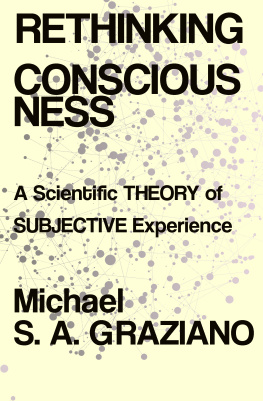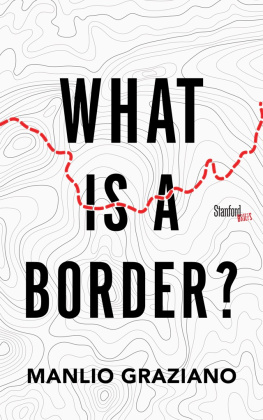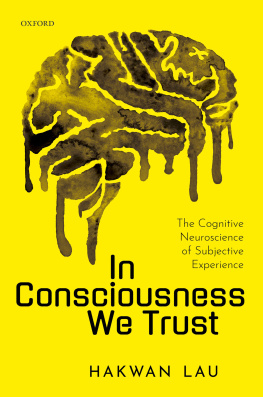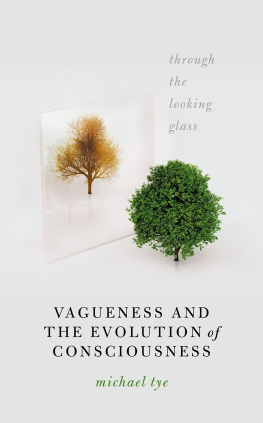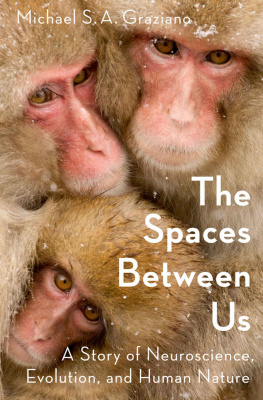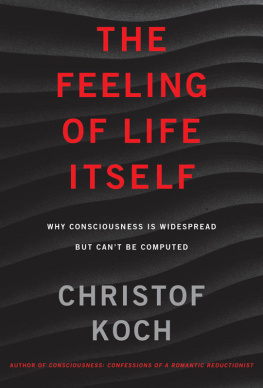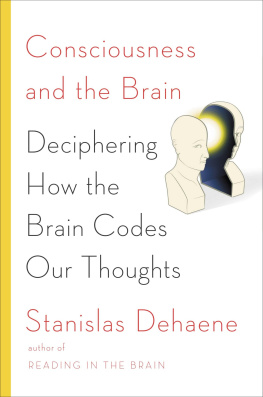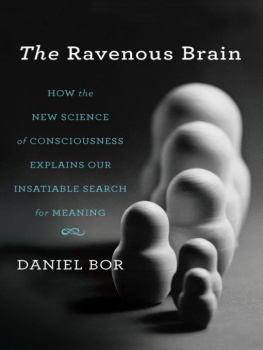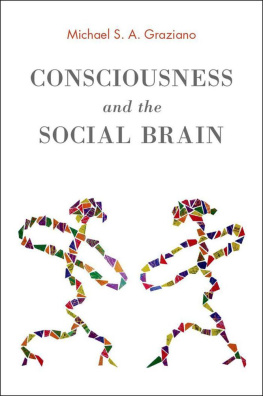Contents
Guide

ALSO BY MICHAEL GRAZIANO
Consciousness and the Social Brain
The Spaces Between Us: A Story of Neuroscience, Evolution, and Human Nature
The Intelligent Movement Machine
God, Soul, Mind, Brain: A Neuroscientists Reflections on the Spirit World
MICHAEL S. A. GRAZIANO
RETHINKING CONSCIOUSNESS

A Scientific Theory of Subjective Experience

Copyright 2019 by Michael S. A. Graziano
All rights reserved
First Edition
For information about permission to reproduce selections from this book, write to
Permissions, W. W. Norton & Company, Inc., 500 Fifth Avenue, New York, NY 10110
For information about special discounts for bulk purchases, please contact
W. W. Norton Special Sales at specialsales@wwnorton.com or 800-233-4830
Jacket design by Kelly Winton
Jacket Image by Liu zishan / Shutterstock
Book design by Ellen Cipriano
Production manager: Lauren Abbate
The Library of Congress has cataloged the printed edition as follows:
Names: Graziano, Michael S. A., 1967 author.
Title: Rethinking consciousness : a scientific theory of
subjective experience / Michael S.A. Graziano.
Description: First Edition. | New York : W.W. Norton & Company, 2019. |
Includes bibliographical references and index.
Identifiers: LCCN 2019014794 | ISBN 9780393652611 (hardcover)
Subjects: LCSH: Consciousness. | ExperiencePsychological aspects.
Classification: LCC B808.9 .G73 2019 | DDC 153dc23
LC record available at https://lccn.loc.gov/2019014794
ISBN 9780393652628 (ebook)
W. W. Norton & Company, Inc., 500 Fifth Avenue, New York, N.Y. 10110
www.wwnorton.com
W. W. Norton & Company Ltd., 15 Carlisle Street, London W1D 3BS
For Ben and Ele
CONTENTS

RETHINKING CONSCIOUSNESS

W HEN MY SON was 3 years old, I made his favorite stuffed elephant talk. At that age he couldnt tell how bad a ventriloquist I was, so the trick worked very well on him. He loved it. Over the next several years, as I improved my technique, the uncanny power of that illusion began to impress me. Ventriloquism is not just a voice that comes out of a puppet, as though out of a hidden speaker. Even in the hands of a mediocre performer like me, something special happens. The puppet comes to life with its own personality, and consciousness seems to emanate from it.
The human brain clearly must contain machinery that impels us to attribute consciousness to the puppet. But we didnt evolve that machinery to enjoy ventriloquism. Humans are social animals, and we routinely use the same trick on each other. When I talk to someone, I have an automatic impression of thoughts, emotions, and awareness emanating from that person. Im not directly perceiving the persons mind, of course. Instead, my brain is constructing a handy model of a mind and projecting it onto the person, treating that person like my son treats the puppet.
We apply the same process to more than just people. We attribute awareness to our pet cats and dogs, and some people even swear that their houseplants are conscious. The ancients felt sure that trees and rivers were sentient; children perceive consciousness in their favorite toys; and heck, the other day I got mad at my computer. So Im not talking about intellectually figuring out whether something has a mind or cleverly deducing what might be in that mindalthough we do that, too. Im talking about an automatic, gut intuition, which is often wrong but sometimes persuasively potent, that an essence of awareness is emanating from an object.
As I thought more about ventriloquism, I began to wonder if my own consciousness and these examples of attributing consciousness to others might stem from the same source. Maybe there is one unifying explanation: we automatically build models of minds and project them onto ourselves and other people. Our intuitions about a mysterious conscious presence, our conviction that it is present in me or you or this pet or that object, might depend on those simplified but useful modelssets of information that the brain constructs to understand its world.
This is the kind of profound insight that can only come from talking to a stuffed elephant. It also diverted my scientific work to the study of consciousness.
For 20 years, I had been studying more traditional issues in neurosciencehow the brain monitors the space immediately around the body and how it controls complex movements within that space. Instead, it explains why people might mistakenly think that there is a hard problem to begin with, why that mistaken intuition is built deep into us where were unlikely to change it, and why its presence is advantageous, maybe even necessary, for the functioning of the brain.
I first understood the theory from the point of view of social interaction. At its root, however, the theory depends on a more general property of the brain: model-based knowledge. The brain constructs internal modelsever-changing rich packets of information, constructed continuously and automatically, like bubbles of meaning that lie beneath the level of higher thought or of language. Those internal models represent important items that are useful to monitor, sometimes external objects and sometimes aspects of the self. The representations are simplified and distorted, like impressionistic or cubist paintings of reality, and we report the content of them as though we are reporting literal reality. We cant help itthey come built into us. Our intuitive understanding of the world around us and our understanding of ourselves, always distorted and simplified, are dependent on those internal models.
In the theory, our metaphysical intuitions about ourselves, about consciousness as a nonphysical inner essencesometimes called the ghost in the machineare derived from a particular internal model. I call it the attention schema, for reasons that will become clear throughout this book. It is a simplified depiction of how the brain seizes on information and deeply processes it. That depiction is an efficient way for the brain to understand and monitor its own internal abilities. The same kind of internal model can also be used, to a lesser extent, to monitor and make predictions about other people.
This model-based approach can sometimes sound like a dismissal or a devaluing of consciousnessbut it is decidedly not. The internal model that tells us we are conscious is deep, rich, continuous, and probably necessary. Almost nothing we doperceiving, thinking, acting, socially interactingwould work properly without that part of the system.
I N THIS BOOK, I will use the terms consciousness , subjective awareness , and subjective experience interchangeably, although I acknowledge that those words are not always used by scholars in an equivalent way. The word consciousness is especially notorious for its many slippery connotations. I want to clarify, first, what I dont mean by it, before I get to what I do mean. Sometimes people think of consciousness as the ability to know who you are and to understand your trajectory through life. Other people think of it more as the ability to process the world around you and on that basis to make intelligent decisions. I mean neither of those things.

